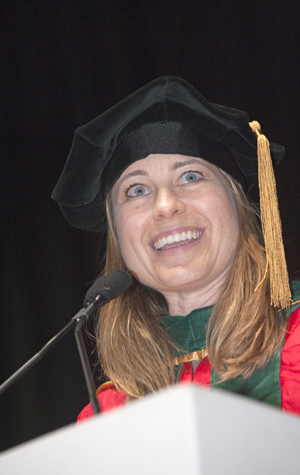“Relationship Is Everything” MED Grads Told
Doctors urged to use “privilege and power” in best possible way

A doctor’s relationship with a patient is the basis of all healing, physician Jessie Gaeta reminded a sea of newly minted doctors at the School of Medicine Convocation, held at Agganis Arena Saturday morning.
Currently medical director of the Boston Health Care for the Homeless Program’s Barbara McInnis House, Gaeta has spent her career working with patients who live in poverty, and as a result, are often chronically ill. She told the MED graduates that they are likely to work with patients with similar issues throughout their careers and urged them to passionately connect with them to build lasting relationships.
Doctors must first recognize the “structural inequities” that influence health, so they can diagnose appropriately, said Gaeta. “Then, ask yourself, how can I, with privilege and power, impact those underlying factors?…Never lose sight of the fact that what you are doing in the lab translates directly to a suffering person—let that guide you in the design and implementation of your research.”
Gaeta, currently a BU Advocacy Training Program core faculty member, was recently named a MED assistant professor of medicine. She earned a medical degree from the University of Maryland School of Medicine, and completed her internship and residency in internal medicine at Boston Medical Center, where she was appointed chief resident of internal medicine in 2001. She became a physician advocacy fellow at Columbia University’s Institute on Medicine as a Profession in 2005. There, she cofounded Home & Healthy for Good, a Massachusetts-based advocacy program that finds permanent housing for the chronically homeless and then treats their illnesses. In 2009, Gaeta was named medical director of the Barbara McInnis House, a 104-bed medical facility that provides respite care to homeless people who are too ill to stay in shelters, but not sick enough to remain hospitalized. She won the Quincy Interfaith Sheltering Coalition’s 2004 Community Hero award and was named BU Medical Center’s department of medicine Teacher of the Year in 2009.
“I am still in awe of the privilege and power we doctors are afforded, even though many years have passed since I sat where you are sitting today,” Gaeta told members of the Class of 2013. “And knowing you as I do, I know you’ll use that privilege and power in the best possible way.”
She cited her own work over the years with a homeless patient she pseudonymously called “Lisa” as an example of a doctor’s privilege in providing care to the homeless. She first met Lisa in a Boston homeless shelter and soon became her primary care physician, often helping her deal with her emphysema. But Lisa also faced extreme poverty, had no family, and was constantly anxious.
As the two women developed a trusting relationship, Gaeta realized that Lisa needed the safety and stability of a home if she was going to thrive.
“Housing was always her ‘self-management goal,’ and eventually I came to see it as the most important prescription I could write for her,” Gaeta told the graduates. “I started working with the shelter administration to prioritize her for housing, making the medical case for it, recounting her hospitals stays, and attesting that she would, indeed, be safe in housing.”
With Gaeta’s help, Lisa moved to a modest double-decker in Quincy. Her emphysema went into remission, her confidence increased, and doctors were able to give her routine checkups. When Lisa was later diagnosed with cancer, the fact that she was able to recover in her home made a huge difference, Gaeta recounted, adding that today, Lisa has a community of friends and occasionally testifies before lawmakers about the resources necessary for the homeless.
Gaeta chose to recount Lisa’s story, she said, because it proved to be a turning point in her career. Lisa taught her that a trusting relationship was the foundation for all the healing that followed.
“There are times when the ‘doing’ implied in providing care will leave you wanting at the bedside—because there is no cure, or because there is a cure but it is no match for the despair of the living conditions that the patient endures, or because no medicine will ease the suffering of the patient,” she said. “Yet you still have something healing to offer your patient: the fact that you are their doctor, all of the time, and the constancy of your relationship with them gives them a connection, a validation, and support that they might not have from anyone else.”
Gaeta urged the graduates to step outside the comfort zone of their individual clinical or scientific field of interest. “Bear witness to injustices that result in poor health, and work to remove those injustices and build health equity,” she said. “This is what healers owe society. And this is what our society desperately needs at this moment in time.”
As degrees were conferred on the Class of 2013’s 222 graduates, cheers filled the arena as some of the new doctors brought their young children on stage when they received their diplomas. The three-hour ceremony concluded with the Oath of the Scientist, read by Linda Hyman, associate provost for MED’s Division of Graduate Medical Sciences, and the Oath of Hippocrates, delivered by Karen Antman, provost of the Medical Campus and dean of the School of Medicine.
Read more about Commencement here.
This BU Today story was written by Amy Laskowski.